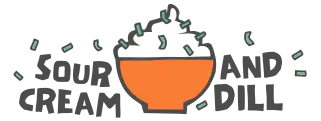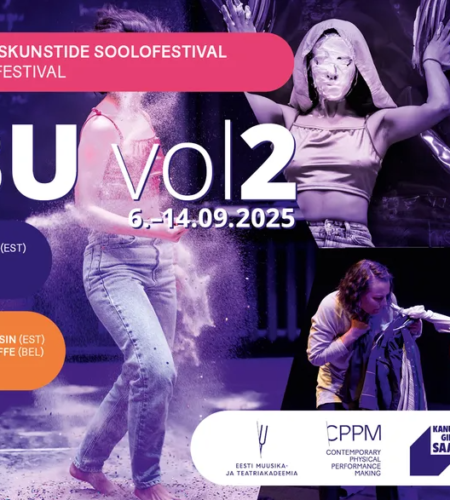It’s midafternoon as the crowd gathers in the cozy theater lobby on Pikk Street, sipping drinks at the bar and chatting amongst each other as they wait for today’s entertainment to start. Today’s show is Läbu Volume 2, Episode 6, with two artists showcasing their performance art pieces as part of the Tallinn Fringe. The common theme: Linguistics. The venue: Kanuti Guild Hall’s intimate secondary stage.
As we file into the dark side room off the entrance of the Guild Hall, we see a woman kneeling before us, waiting patiently in center stage. She makes direct eye contact with individual audience members as we find our seats, instantly creating an air that feels private and personal. Thus begins a unique experience put on by Annette Pärn, as she offers up her piece “Waistland,” a twisting journey through language, meaning, identity, and storytelling.

The entire performance is a winding road, a tour through the “waistland” that begins in nature mockumentary style before turning in parts to semiotics lecture, dance, Duolingo-esque session, bedtime story, personal recollection, and more. Pärn is mesmerizing with the control she wields over her body, incorporating dynamic movement throughout her piece. She contorts, writhes, trembles, and gyrates, making full use of the available space. In whatever position she takes, Pärn is engaging, utilizing intense eye contact through the performance, seeming to speak to each spectator individually with her exacting gaze.
Her commentary on how war and violence impact our language is intriguing, as are her observations on how the world is made up of what we know, what we know we don’t know, and what we don’t know we don’t know. After Pärn’s act, I speak with a couple of audience members who remark that they need some time to process what they just witnessed. One woman comments that it was an amazing use of the human body and movement to convey a deeper personal message.
After an intermission, the second show begins in the same side theater. The seating has been switched around to create four long rows of chairs up against the right wall. The spectators enter as a woman paints a quote in gold paint on the opposite side of the room. As the crowd settles in, the woman, artist Dita Lūriņa, turns and begins to speak. And so “After the Tower of Babel” begins, taking us on another linguistic journey, this time with a more academic approach.

Lūriņa creates a dynamic performance, using tea kettles, lamps, paper and paint, as well as her own body to highlight various linguistic differences across languages. Her point—that language is contentious and as intrinsic to identity and personal understanding as anything else—is clear through her examples. She relies heavily on audience participation, coaxing speakers of numerous languages to share the different way things are said in their mother tongues. The finale is nothing short of moving, as she welcomes on stage two young women who are some of the only remaining speakers of the Livonian language. They close out the piece with a song in Livonian, after speaking on their own personal stories on linguistic identity.
The show feels like attending a favorite professor’s greatest lecture, the whole experience becoming equal parts education and entertainment in the best possible way. Lūriņa somehow makes concepts of language tangible and tactile, bringing different senses of sight, sound, and touch into the audience’s understanding of linguistic variance—not an easy task to accomplish. Overall, audience members seem to be touched by the performance, particularly the ending segment, stating their surprise at how much they learned and how moved they were by the show.
While 2025’s Läbu season may be over, there will be another round yet again in the summer of next year. In the meantime, you can find both artists on Instagram: Annette Parn Ι Dita Lūrina or check out the current Kanuti Guild Hall program here.

Subscribe to our email newsletter to get the latest posts delivered right to your email.

